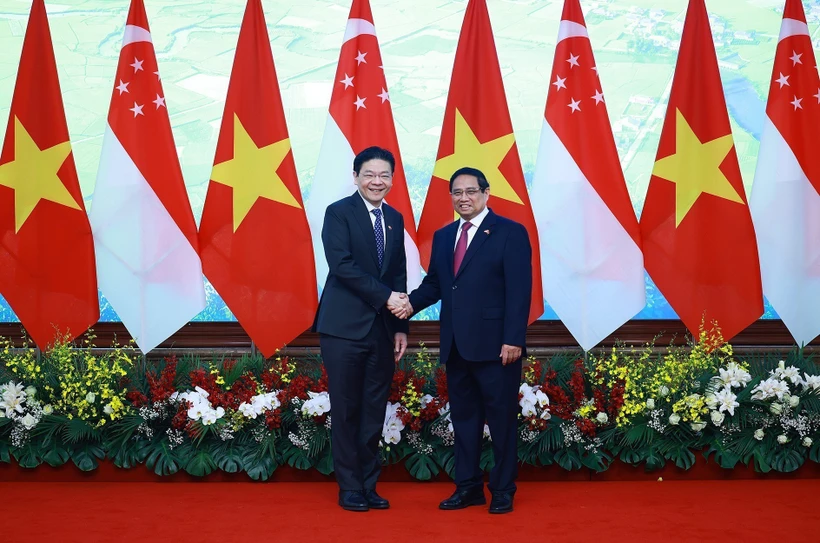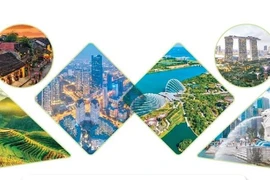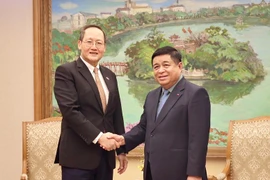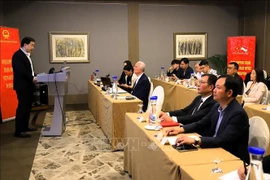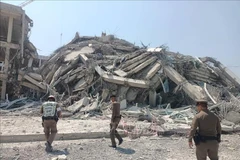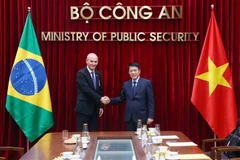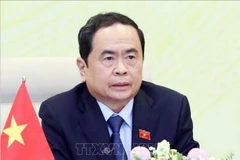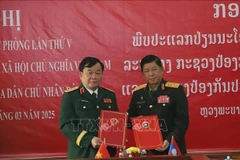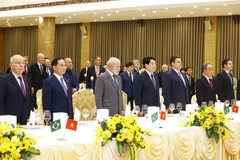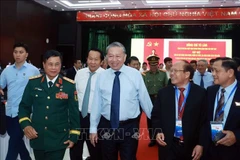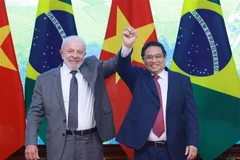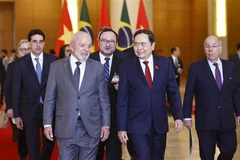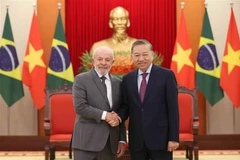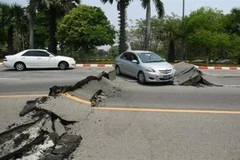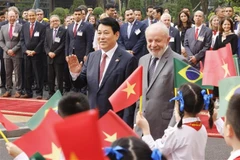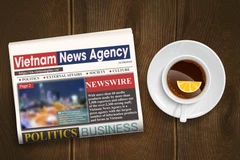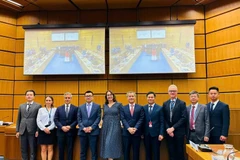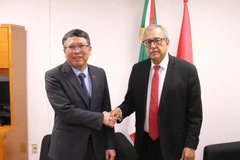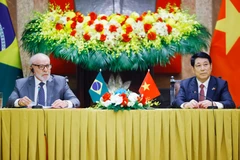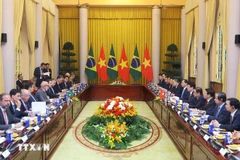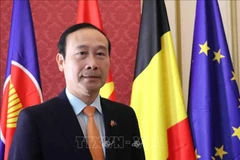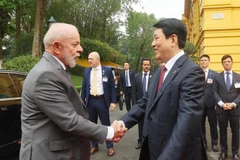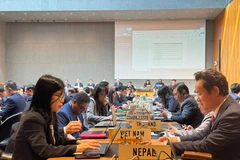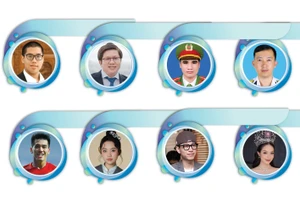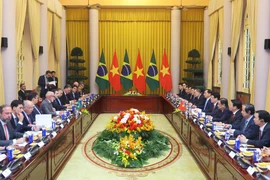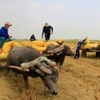Hanoi (VNA) - Prime Minister Pham Minh Chinh and his Singaporean counterpart Lawrence Wong held talks in Hanoi on March 26, agreeing on decisive and timely measures for enhancing political trust and creating new breakthroughs for the two countries' comprehensive strategic partnership.
The Vietnamese Government leader highlighted the significance of his guest's official visit, saying that this is the first high-level trip since the two countries upgraded their relationship to a comprehensive strategic partnership during Vietnamese Party General Secretary To Lam’s official visit to Singapore.
It is also a highlight for 2025, which marks the 80th anniversary of Vietnam's National Day and the 60th anniversary of Singapore's, sending a strong message about the two countries' determination to realise the new cooperation framework, he said.
The host congratulated Singapore on its development achievements and wished the country success in organising its general election in 2025. He expressed his belief that the city state will successfully implement the Forward Singapore (Forward SG) and "Singapore Dream" initiatives, thus building a fair, harmonious, and increasingly prosperous society.
Chinh said that Vietnam is implementing a strategy of speeding-up and making breakthroughs to reach the finish line, striving to achieve double-digit growth from 2026 onwards, towards entering a new era – that of the nation’s rise and prosperous, civilised, and thriving development.
For his part, Wong expressed his delight at his first visit to Vietnam as the PM of Singapore, stressing that his trip aims to promote the implementation of cooperation outcomes between the two countries.
He affirmed that Vietnam is one of Singapore's most important partners in the region, and congratulated Vietnam on its remarkable achievements after 40 years of the “Doi moi” (renewal) process to become one of the leading economies in ASEAN.
The Singaporean PM emphasised the historic significance of the establishment of the comprehensive strategic partnership, stating that Vietnam being Singapore's first comprehensive strategic partner in ASEAN reflects the trust, close-knit ties, and aspirations of both countries' leaders and peoples to develop the Vietnam – Singapore relations more extensively, intensively, and effectively.
Both leaders expressed their satisfaction with the robust development of the bilateral relations. Singapore has maintained its position as the second-largest foreign investor in Vietnam, with two new Vietnam – Singapore Industrial Parks (VSIPs) getting investment approval, expanding their network to 20 facilities across 14 cities and provinces. The bilateral trade volume demonstrated steady growth, reaching 10.3 billion USD in 2024, with Vietnam emerging as Singapore's largest rice exporter.

The talks between Prime Minister Pham Minh Chinh and his Singaporean counterpart Lawrence Wong in Hanoi on March 26. (Photo: VNA)
The PMs also acknowledged considerable advancements in defence, security, education, technology, tourism, labour, and people-to-people exchanges.
They committed to decisive and timely measures to bolster political trust, creating breakthroughs for the comprehensive strategic partnership. They aim to swiftly complete and effectively carry out an action programme, bringing in full play their new cooperation framework for 2025-2030.
The two sides concurred to enhance the exchange of delegations at all levels, effectively implement bilateral cooperation mechanisms, and reinforce defence and security collaboration on the basis of mutual confidence and understanding, contributing to peace, stability, and development in the region and the world.
They pledged to enhance economic connectivity through five key pillars of the Vietnam – Singapore Connectivity Framework Agreement and the Green Economy-Digital Economy Partnership, positioning the bilateral cooperation as the regional exemplar.
Chinh proposed Singapore to create favourable conditions for Vietnamese agro-forestry-fishery products and processed food to hit the shelves of its distribution system. Besides, he suggested developing the VSIP 2.0 network with a focus on sustainability and smart technologies to optimise high-quality investment attraction.
His Singaporean counterpart agreed to clarify key aspects of upgrading the VSIP network, ensuring greener and more intelligent and efficient development. He also endorsed the Vietnamese leader's “six major goals” proposal, which encompasses deeper political trust, more substantive defence cooperation, more effective economic connectivity, stronger people-to-people exchanges, more breakthrough science-technology collaboration, and closer international regional cooperation.
Wong highlighted the need for substantive development in offshore wind energy export, carbon credit exchange, and fintech collaboration through the cross-border retail payment connection project using QR codes and data transmission, helping facilitate enterprises’ business operation.
The two leaders agreed to deepen cooperation in key areas, including education, workforce training, food security, cultural and art exchanges, tourism, and aviation, business-to-business and people-to-people connectivity.
PM Chinh proposed that Singapore receive Vietnamese workers under its labour visa scheme, expand the range of accepted professions, facilitate Vietnamese language education in schools with a significant number of Vietnamese students, and help promote the role of the Vietnamese expat community there.
On regional and multilateral cooperation, both host and guest commended their nations’ close coordination and mutual support in their candidacies for posts within UN organisations. They agreed to work with other ASEAN member states to maintain the bloc’s solidarity, unity, and centrality, as well as to advance sustainable development in subregions, including the Mekong subregion.
The two PMs agreed to maintain the shared stance of ASEAN on the East Sea, underscoring the importance of maritime and aviation freedom and safety. They said there is a need to fully and effectively implement the Declaration on the Conduct of Parties in the East Sea (DOC) and foster an environment conducive to the development of a substantive and effective Code of Conduct in the waters (COC) in line with international law and the 1982 United Nations Convention on the Law of the Sea (UNCLOS).
Following their talks, the Vietnamese and Singaporean leaders witnessed the signing of several cooperation agreements, including a letter of intent on developing an action programme for the countries’ Comprehensive Strategic Partnership. Other pacts cover offshore wind power trade, cross-border QR code payments, digital development and innovation, and people-to-people exchange./.
